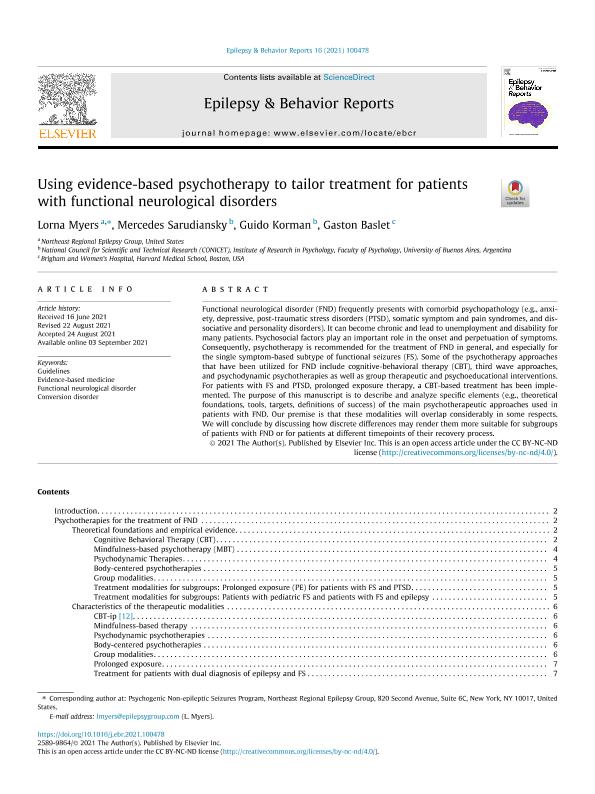Artículo
Using evidence-based psychotherapy to tailor treatment for patients with functional neurological disorders
Fecha de publicación:
01/2021
Editorial:
Elsevier
Revista:
Epilepsy and Behavior Reports
ISSN:
2589-9864
Idioma:
Inglés
Tipo de recurso:
Artículo publicado
Clasificación temática:
Resumen
Functional neurological disorder (FND) frequently presents with comorbid psychopathology (e.g., anxiety, depressive, post-traumatic stress disorders (PTSD), somatic symptom and pain syndromes, and dissociative and personality disorders). It can become chronic and lead to unemployment and disability for many patients. Psychosocial factors play an important role in the onset and perpetuation of symptoms. Consequently, psychotherapy is recommended for the treatment of FND in general, and especially for the single symptom-based subtype of functional seizures (FS). Some of the psychotherapy approaches that have been utilized for FND include cognitive-behavioral therapy (CBT), third wave approaches, and psychodynamic psychotherapies as well as group therapeutic and psychoeducational interventions. For patients with FS and PTSD, prolonged exposure therapy, a CBT-based treatment has been implemented. The purpose of this manuscript is to describe and analyze specific elements (e.g., theoretical foundations, tools, targets, definitions of success) of the main psychotherapeutic approaches used in patients with FND. Our premise is that these modalities will overlap considerably in some respects. We will conclude by discussing how discrete differences may render them more suitable for subgroups of patients with FND or for patients at different timepoints of their recovery process.
Archivos asociados
Licencia
Identificadores
Colecciones
Articulos(SEDE CENTRAL)
Articulos de SEDE CENTRAL
Articulos de SEDE CENTRAL
Citación
Myers, Lorna; Sarudiansky, Mercedes; Korman, Guido Pablo; Baslet, Gaston; Using evidence-based psychotherapy to tailor treatment for patients with functional neurological disorders; Elsevier; Epilepsy and Behavior Reports; 16; 1-2021; 1-10
Compartir
Altmétricas




